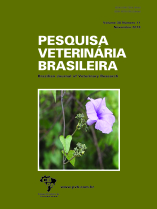 |
|
|
|
Year 2018 - Volume 38, Number 11
|

|
Histopathological and immunophenotypical assessment of canine primary splenic lymphoma according to the World Health Organization, 38(11):2129-2132
|
ABSTRACT.- Fracácio C.P., Sueiro F.A.R., Anai L.A., Pucci M.B., Senhorello I.L.S., Barata J.S. & Jark P.C. 2018. Histopathological and immunophenotypical assessment of canine primary splenic lymphoma according to the World Health Organization. [Avaliação histopatológica e imunofenotípica segundo a classificação da Organização Mundial da Saúde do linfoma esplênico primário em cães.] Pesquisa Veterinária Brasileira 38(11):2129-2132. Departamento de Clínica Veterinária e Cirurgia, Faculdade de Ciências Agrárias e Veterinárias, Universidade Estadual Paulista, Via de acesso Prof. Dr. Paulo Donato Castellane s/n, Jaboticabal, SP 14884-900, Brazil. E-mail: paulocjark@hotmail.com
Although there are several studies addressing multicentric lymphoma in dogs, data regarding splenic lymphoma remains scarce. The diagnosis of splenic lymphoma using the World Health Organization (WHO) classification system can aid prognostic characterization of splenic lymphoma. The aim of this study was to evaluate the most common histological types of splenic lymphoma in dogs from Brazil according to the WHO classification. We assessed 33 cases of splenic lymphoma diagnosed by histopathologic and immunohistochemical (IHC) analysis submitted to VETPAT- Pathology Laboratory, Campinas-SP, Brazil. IHC was performed using antibodies against CD3 for T-cell and CD79α for B-cell identification . Mean age of patients with splenic lymphoma was 9.8 years. The most affected breeds were mixed breed dogs (33%) followed by Pit bulls and Yorkshires (9.0%). The most prevalent histological type was marginal zone B-cell lymphoma (60.7%) followed by diffuse large B-cell lymphoma (12.1%) and lymphoblastic T-cell lymphoma (12.1%). Histological and immunohistochemical characterization of splenic lymphoma is important due to the high prevalence of indolent lymphomas such as marginal zone, which may be less aggressive and thus have different prognostic and distinct forms of treatment when compared to high-grade lymphomas.
|
| |
|
|
| |
|
 |